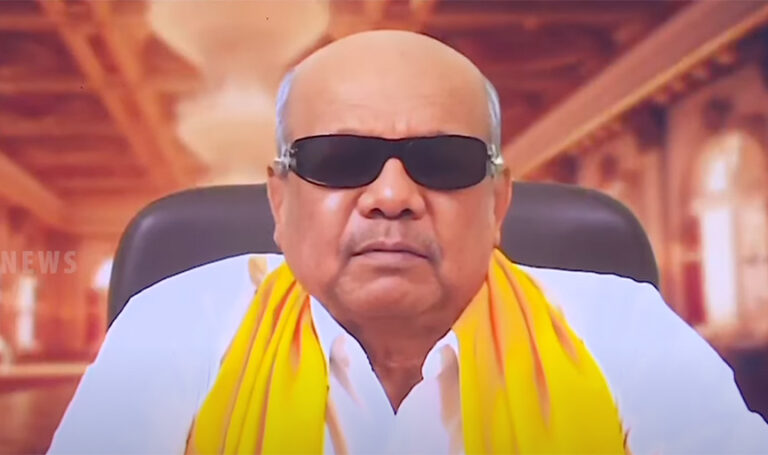AI used to resurrect dead Indian politician M. Karunanidhi ahead of elections
In 2022, we saw South Korea elect the leading conservative candidate Yoon Suk-yeol as its new president following a campaign that used AI, more specifically deepfakes, to boost his popularity among younger audiences.
Fast forward to 2024, and Muthuvel Karunanidhi, an iconic figure in Indian cinema and politics, has made not one, not two, but three posthumous appearances in the past six months. Dressed in his signature style, donning black sunglasses and a yellow shawl, Karunanidhi delivered an eight-minute speech congratulating a fellow politician on the launch of his autobiography. The twist? Karunanidhi has been dead since 2018. Welcome to the age of AI-driven political theatrics. We’ve been waiting for you.
Who was M. Karunanidhi?
When he was alive, Karunanidhi stood out as one of India’s longest-serving legislators, captaining the southern state of Tamil Nadu for nearly two decades across five compelling terms as chief minister. His poet-turned-politician legacy, which primarily focused on narratives of lower caste emancipation, continues to resonate—especially among the seasoned electorate.
So, it would make sense that if AI was going to be employed to bring back any famed politician, it would be Karunanidhi. In fact, the legislator’s recent reappearance has proved to be so popular that members of the Dravida Munnetra Kazhagam (DMK) party have begun considering continuing to use deepfake campaign videos of Karunanidhi for the upcoming 2024 parliamentary election.
Who created the Karunanidhi deepfake?
The brain behind this avant-garde political drama is Muonium, an AI media tech firm. Senthil Nayagam, the founder, proudly claims that there’s a growing market for such deepfakes. After all, attributing statements to a deceased person does add a certain flair to political campaigns, doesn’t it?
Speaking on the impact these kinds of videos can have with Al Jazeera, Nayagam stated: “You can attribute some statements to a particular person and that kind of gives more value to it.”
The AI version of Karunanidhi first debuted at a local media event in September 2023, followed by a cameo in a party campaign. In these moments of resurrection, the politician frequently commends the efforts of party workers and offers specific praise for the leadership of his son, M.K. Stalin. In fact, all of his statements are orchestrated with the intention of bolstering his son’s popularity.
During a book launch in January 2023, Karunanidhi eloquently recounted a myriad of achievements attributed to his son. These accomplishments ranged from initiatives such as pardoning student debt and providing cash giveaways to the underprivileged, to implementing female-friendly policies and attracting investments. The detailed list aimed to highlight the positive contributions made by his son over the years, showcasing the progress of the state under his leadership. Well, isn’t it convenient that even from the great beyond, Karunanidhi has the perfect pitch for his son’s achievements?
Does AI belong in politics?
While an artificial Karunanidhi may be the new sensation, ethical and legal questions remain a concern for many. Amber Sinha, senior fellow for Trustworthy AI at Mozilla Foundation, rightly questions the morality of resurrecting the dead solely for political gain.
As the world gears up for national elections in over 60 countries in 2024, the looming spectre of potential artificial intelligence misuse to sway public opinion has become more than just a topic of concern; it’s a global hot-button issue.
2024 is one of the most significant election years in history & #AI-driven disinformation could define it. We can't afford to be bystanders to this risk. Great to see @OpenAI are taking this seriously & showing responsible leadership with these measures. https://t.co/G6UoP0gfkb
— Joanna Shields (@joannashields) January 17, 2024
India isn’t alone in this new campaign method. In Indonesia, former military general Prabowo Subianto has seen great success after an avatar displaying him as a cuddly grandpa took the internet by storm. According to the BBC, Subianto’s bloody past and human rights allegations have been overtly softened with this new ‘friendlier’ media campaign.
Similarly, in Bangladesh, the use of AI in political campaigns has gained prominence, with instances ranging from deepfake tactics targeting opposition parties to former Prime Minister Imran Khan campaigning from his prison cell in Pakistan through AI-generated audio speeches.
Who owns the rights of the dead?
An additional conundrum arises: who owns the rights to a dead person’s voice and likeness? While Indian law protects against defamation of a deceased person, ethical considerations of consent come into play. The resurrection of Karunanidhi through AI raises questions about where the line between homage and manipulation should be drawn.
Sinah explained how one may argue that creating AI videos of politicians is simply an extension of the use of photographs or images of dead persons by their political parties. However, she goes on to state: “Creating synthetic audio or video goes several steps further. In both cases, the party is trying to leverage the popularity of a dead person, but in the latter, opinions and messages are actively ascribed to them.”
Beyond Karunanidhi, it’s evident that AI is seeping into various facets of Indian political campaigns. Candidates are exploring AI voice clones for outbound calls, personalised messages, and even multilingual content on social media. The synthetic media economy is booming, which in turn, is also giving rise to concerns about misinformation and disinformation.
Whether these AI videos shape voter attitudes or merely entertain the masses remains to be seen. In a world where even the deceased can make a comeback, Indian politics has entered a new era—one where the lines between reality and simulation blur, and AI steals the limelight in the political theatre. Welcome to the future, where politicians, living or dead, can still sway the masses with a touch of technological wizardry.






